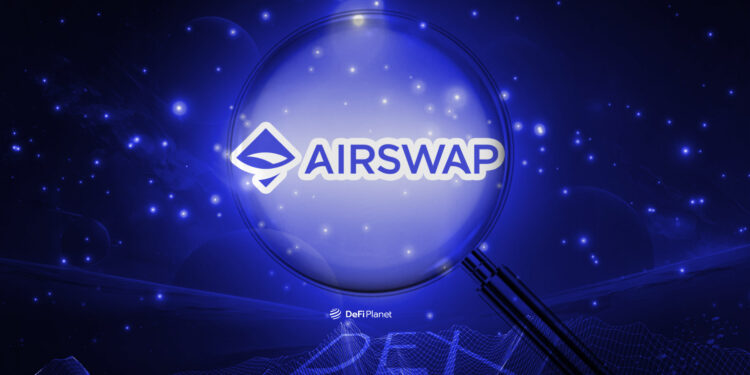TL;DR:
AirSwap is a decentralized peer-to-peer (P2P) trading platform that uses smart contracts on the Ethereum blockchain to facilitate safe and reliable cryptocurrency trades.
It aims to simplify trading by offering low costs, no order book, and no rules for deposits or withdrawals.With the help of AirSwap’s “Indexer” search engine, users can find the best trade rates, and the “Swap” protocol allows for immediate exchanges with no counterparty risk.
AirSwap may be a desirable choice for investors and traders seeking a decentralized marketplace to buy and sell cryptocurrencies because it prioritizes liquidity, user experience, and connection with other Ethereum-based platforms.
In recent years, decentralized exchanges (DEXs) have gained popularity as a safer and more transparent alternative to centralized exchanges. AirSwap, a frontrunner in this space, has been steadily attracting the attention of cryptocurrency traders and enthusiasts.
AirSwap is a peer-to-peer trading platform based on the Ethereum blockchain, where users can trade digital assets without requiring an intermediary. The platform focuses on enhancing privacy and security while maintaining transparency and ease of use.
This article provides a comprehensive overview of AirSwap, detailing its functionality, unique features, limitations, and potential impact on the future of decentralized exchanges. By the end, you’ll gain a thorough understanding of AirSwap’s offerings and be able to assess its suitability for your trading needs.
What is AirSwap?
AirSwap is a decentralized exchange (DEX) where users execute peer-to-peer trades of Ethereum-based tokens. Users communicate directly to negotiate token swaps and prices, ensuring asset ownership retention.
Trades occur via smart contracts known as the Swap Protocol. AirSwap’s launch coincided with the release of the Swap Protocol whitepaper in May 2017, which comprehensively outlines the underlying architecture of the AirSwap ecosystem.
How AirSwap Works: Trading Without an Order Book
Unlike conventional exchange systems, AirSwap doesn’t operate an order book. Instead, it matches buyers and sellers according to their set criteria by using a system of smart contracts called “indexers”.
For instance, a buyer could submit a request to the indexer to buy 10 ETH at $1,400 each. The indexer would then look for a vendor ready to accept that price of 10 ETH. The trade is carried out once a match has been made.
The platform also allows buyers and sellers to negotiate the conditions of their trade directly. This is especially helpful for larger trades that need more complex terms. For instance, a buyer may want to acquire a lot of ETH but may want to bargain down the price from what is currently being offered on the market. The buyer can then start haggling with a seller who is prepared to sell their ETH for less.
AirSwap offers a special feature called Request for Quote (RFQ) Trading that allows buyers to receive multiple quotes from sellers at once. Interestingly, this feature eliminates the need for direct negotiation between buyers and sellers and makes the sales process more efficient. Once the RFQ is issued, sellers can respond with their best bids. The buyer can then choose the most suitable offer and complete the transaction.
Because of the lack of order books, there are no fees for deposits or withdrawals on the platform. AirSwap Tokens (AST) serve as the primary revenue source, facilitating payments for platform services and promoting token adoption.
The platform does not require the traders’ private information or user-sensitive data, nor does it work with third-party service providers.
Challenges And Limitations of Using AirSwap
AirSwap provides a decentralized, user-friendly, and fee-free trading platform for ERC-20 tokens. It does, however, have a number of drawbacks that users should carefully consider before deciding to use it.
Limited Trading Pairs
AirSwap has a limited selection of trading pairs since it exclusively supports ERC-20 tokens. This means users are unable to trade popular cryptocurrencies such as Bitcoin or Litecoin on the platform. This limitation may affect users looking for a more diverse range of trading options that include non-ERC-20 tokens.
Low Trading Volume
AirSwap currently experiences lower trading volumes compared to more established centralized exchanges. The limited trading activity on the platform is attributed to its recent entry into the market, resulting in lower liquidity and potentially increased price volatility. As AirSwap continues to grow and gain traction, its trading volume and overall market presence may evolve over time.
No Order Books
Though somewhat beneficial, the absence of order books on AirSwap poses challenges for traders in obtaining a comprehensive market overview. Instead of traditional order books, the platform employs a peer-to-peer matching system, potentially creating a less transparent trading environment unfamiliar to traders accustomed to conventional setups.
Limited Functionalities
AirSwap has limited functionalities compared to older exchanges, lacking features such as handling advanced order types like stop-loss orders or margin trading. This constraint may impact users seeking a more diverse range of trading options and strategies that are commonly available on established platforms with a broader set of features.
No Fiat Currency Support
AirSwap exclusively facilitates cryptocurrency transactions and does not extend support for traditional fiat currencies. This lack of fiat currency support may pose a limitation for individuals who prefer or rely on such transactions—the platform’s adoption by a broader user base is also affected by this, considering that crypto is still considered an alternative and not the de facto currency.
Regulatory Concern
Airswap is a DEX, and there aren’t any regulations governing the operations of such platforms. Unregulated exchanges lack the safeguards of regulatory authorities, increasing the risk of fraud, market manipulation, and security breaches. Users may encounter challenges in seeking recourse or resolving disputes due to the absence of regulation. Additionally, the lack of regulatory oversight can result in a less transparent trading environment, making it challenging for users to assess the legitimacy and reliability of the exchange.
How AirSwap Compares With Other Decentralized Exchanges
Despite being a decentralized cryptocurrency exchange, it operates differently compared to other decentralized exchanges. Though AirSwap shares similarities with other DEXs, some significant differences still exist.
Unlike other DEXs, AirSwap is a stand-alone service that manages and stores user funds without the help of a third party. Since users don’t have to sign up for an account, they have full control over their crypto assets and can trade anonymously.
AirSwap’s emphasis on peer-to-peer (P2P) trading also sets it apart from other DEXs. Unlike some other DEXs like Uniswap and PancakeSwap, which rely on automated market makers (AMMs) to match deals, the platform uses a network of “indexers” to help bring together people who want to buy and sell.
These indexers are third-party programs that keep a searchable database of the tokens that are offered and their costs. AirSwap scans these databases when a buyer or seller makes a transaction to discover the best match for a trade.
Airswap also uses an “off-chain negotiating” approach in which buyers and sellers communicate directly to decide on the conditions of the trade, and this leads to a faster and more efficient trading process, especially since a third party does not match orders.
More so, the AirSwap interface is easy to use and understand. Users don’t need to have any prior technical expertise or blockchain technology experience. Some users, however, might like the more sophisticated features and customization choices that other DEXs provide.
Potential Future Impact on the Decentralized Exchange Market
AirSwap’s radical approach to digital assets trading will influence the development of decentralised exchanges in the future. Here are some ways the influence might be observed.
1. Increased Liquidity
The lack of liquidity is one of DEXs’ main challenges. AirSwap’s solution to this challenge is allowing users to build their liquidity pools. As a result, traders won’t have to worry about finding a counterparty while buying and selling cryptocurrencies. AirSwap may end up being the preferred choice for traders wishing to exchange cryptocurrencies if the platform’s liquidity increases.
2. Enhanced User Experience
Another challenge that most DEXs encounter is the user experience. AirSwap has tackled this issue by streamlining its trading procedure and making it simple to identify the lowest pricing. As more users move to AirSwap, other DEXs may be compelled to enhance their user experience so that they can remain competitive.
3. More Integration With Other Platforms
Since AirSwap is based on the Ethereum blockchain, it can be integrated with other Ethereum-based platforms. For instance, if AirSwap was connected to Aave, users could borrow and lend cryptocurrencies directly on the platform.
In conclusion, AirSwap could potentially be the future of decentralized crypto exchanges, given its P2P protocol solution and the notable advantage of users not paying fees to conduct their transactions. This innovative approach positions AirSwap as a promising player in the evolution of decentralized cryptocurrency trading platforms.
Disclaimer: This article is intended solely for informational purposes and should not be considered trading or investment advice. Nothing herein should be construed as financial, legal, or tax advice. Trading or investing in cryptocurrencies carries a considerable risk of financial loss. Always conduct due diligence.
If you would like to read more articles (news reports, market analyses) like this, visit DeFi Planet and follow us on Twitter, LinkedIn, Facebook, Instagram, and CoinMarketCap Community.
“Take control of your crypto portfolio with MARKETS PRO, DeFi Planet’s suite of analytics tools.”





















